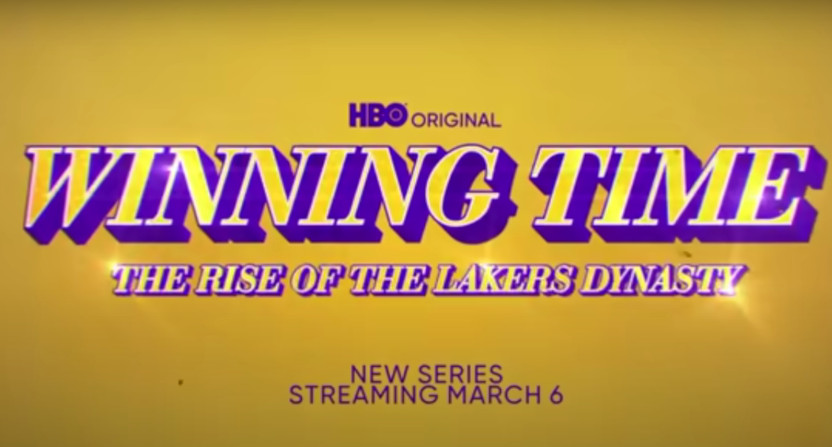We often have a simplistic view of success. Winning is more of a goal than a plan. In sports, like life, few things follow a script. The behind-the-scenes tale is never linear. There are stops, starts, and unexpected detours. When you add ego, it can be even more unpredictable.
The Magic Johnson-led Los Angeles Lakers of the 1980s get the Adam McKay treatment in Winning Time. The story seems as elementary as the Lakers drafting Magic and immediately becoming a dynasty. That’s true, but it wasn’t easy. The details of this journey are chronicled in Jeff Pearlman’s 2014 book Showtime, which serves as the source material for Winning Time.
Those Lakers ushered in a fresh style of basketball so eye-catching that it was called Showtime. A no-look pass here, a fastbreak dunk there. They were a must-see event that helped build the modern NBA. McKay matches that energy with flashy storytelling. Winning Time is an easy watch. It rarely drags because like Magic, McKay pushes the tempo in each hour-long episode.
McKay’s gift is his ability to cut through the jargon and explain complex ideas to a broad audience. He did so successfully in The Big Short, Vice, and Don’t Look Up. Telling a basketball story about some of the most famous people in sports history doesn’t require the same tricks. Nevertheless, McKay leans into his trademark gimmicks to give Winning Time pizzazz. You’ll see freeze frames, animation, and breaking the fourth wall. Sometimes it works exceptionally well. Sometimes it’s distracting.
McKay loves his indulgences.
What’s remarkable about Winning Time is the attention to detail. This stunning visual achievement seamlessly blends original material with archival footage. So much so that there are moments when it’s difficult to differentiate between what is newly filmed and what is old. The series itself is meant to look like the 1980s and succeeds. From the clothing and hairstyles to little things like Gatorade bottles in the locker room, Coors beer cans in the coaching offices, and vintage corporate signage at The Forum.
The casting is also a triumph. Everyone fits with few exceptions. You can credibly believe John C. Reilly as Jerry Buss, an obsessed let-the-good-times-roll extrovert with a voracious appetite for basketball and sex. Reilly does very good work here, although we will always wonder how Will Ferrell would have handled the role. Ferrell is a vastly underrated dramatic actor.
Home court advantage. #WinningTime pic.twitter.com/ArbPfA2HQF
— Winning Time: The Rise of the Lakers Dynasty (@winningtimehbo) February 20, 2022
Winning Time struck gold with Quincy Isaiah, a former Division III football lineman. It can be incredibly difficult to cast basketball players, especially when you’re talking about Magic Johnson. With Magic, you not only have to get the physique right but his unique personality. There has never been an NBA player quite as charismatic, so finding the right person to replicate that on screen must have been daunting. Isaiah captures much of what made Magic attractive to so many people: his luminous smile, his charm, and his desire to have a positive connection with everyone.
This role could have easily devolved into an annoying caricature. But Isaiah brings the best qualities of Magic to life.
When that trailer drops…
— Q (@quincy_isaiah) December 9, 2021
pic.twitter.com/oR7icQOiCR
Isaiah isn’t the only surprise.
Two of the better performances come from two of the smaller roles: Gaby Hoffmann as Claire Rothman and Tracy Letts as Jack McKinney. You might remember Hoffmann as Adam Driver’s kooky sister in Girls. Here she plays a vastly different character: a by-the-book accountant turned Lakers executive. Hoffmann is great at expressing the exasperation of being a woman trying to do her job in the misogynistic world of the 80s. Hoffmann plays the character with an interesting mix of wit and annoyance while trying to placate her difficult boss (Buss).
A hot date with the books #WinningTime pic.twitter.com/ZnjX5zqiw2
— Winning Time: The Rise of the Lakers Dynasty (@winningtimehbo) February 27, 2022
Letts is an outstanding actor who probably deserved a supporting Oscar nomination for his portrayal of Henry Ford II in Ford v Ferrari. The story of McKinney is one of the highlights of Winning Time because it’s one of the great sports what-ifs of all time. If not for a freak accident, perhaps McKinney would be on the Mount Rushmore of NBA coaches. The Pat Riley we know today might not exist. When we first meet McKinney, he’s a nerdy guy who “looks like an accountant.” As the show progresses, it’s a joy to see Letts evolve the character into a hardcore basketball mind with revolutionary ideas.
Not many actors could pull off that transformation quite like Letts.
Dream teams. #WinningTime pic.twitter.com/mj3IvXx7qV
— Winning Time: The Rise of the Lakers Dynasty (@winningtimehbo) February 3, 2022
At its best, Winning Time does an excellent job of showing tense interactions between Magic and Kareem Abdul-Jabbar (Solomon Hughes), Pat Riley (Adrien Brody) and Paul Westhead (Jason Segel), Jerry West (Jason Clarke) and Buss, etc.
At its worst, Winning Time goes over the top with cartoonish sex scenes which include bad jokes. The breaking the fourth wall narration gets tiring. Plus, the racism, sexism, and homophobia that was prevalent in the 80s feels clunky and should have been handled with more care.
Despite the flaws, McKay accomplishes his goal. Winning Time educates us on what it takes to win it all.
Winning Time premieres on March 6 at 9 p.m. ET/PT on HBO, and will also be available to stream on HBO Max.






